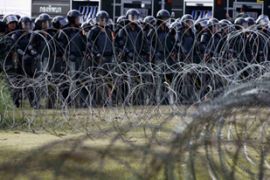Thailand caught in protest standoff
Red Shirts vow more demonstrations as prime minister rejects call for fresh elections.

Following the demonstration, the protesters are heading back to the capital to continue with their protests.
Grenade attack
Amid the standoff, there have been reports of two soldiers being injured in a grenade attack on an army base in Bangkok.
| in depth | |||||||||
|
Four grenades exploded at the base in the centre of the capital at 1.30pm (0630 GMT), injuring one soldier in the arm and the other in the stomach, Colonel Sunsern Kaewkumnerd, a military spokesman, told AFP news agency.
The incident occurred even as tens of thousands of soldiers and police patrolled the streets of Bangkok to prevent any outbreak of violence in view of the protests.
Abhisit had moved his government to army barracks outside of Bangkok as a precautionary measure.
Thousands of Red Shirt demonstrators had been gathering in Bangkok since Friday, with around 150,000 attending a huge rally in the city on Sunday.
Most Red Shirts are supporters of Thaksin Shinawatra, the former Thai prime minister ousted in a 2006 coup.
| In video |
|
Al Jazeera’s Wayne Hay reports on Thailand’s continued protest standoff |
They believe the current government, led by Abhisit, did not take power legitimately and is propped up by segments of Thailand’s traditional ruling class who were threatened by Thaksin’s popularity, especially among the poor.
Many of the protesters travelled to Bangkok from Thailand’s poor, rural northern and eastern provinces – areas where support for Thaksin has traditionally been strongest.
So far the protests have been generally peaceful and leaders of the Red Shirts, known formally as the United Front for Democracy against Dictatorship (UDD), have pledged they will remain that way.
But Abhisit has warned the public not to be complacent about the potential for violence.
Wayne Hay, Al Jazeera’s correspondent in Bagkok, said that despite Abhisit’s rejection of their demands the mood among the Red Shirts was one of determination.
Determined demonstrators
“They say they will achieve their goal of bringing down the government within days,” he said.
“The government in response to that has said they can protest as long as they want as long as they do not break any laws and disrupt the daily lives of the residents of Bangkok.”
In Bangkok several main roads near government offices were blocked off either by protesters’ pick-up trucks and motorcycles, or cordoned off by police and soldiers.
Authorities have deployed 50,000 police, soldiers and other security personnel at key points in the capital, with thousands more placed on alert at barracks across the city.
| Thailand’s Red Shirts |
|
|
An army spokesman said security had been beefed up with hundreds of extra troops at the infantry base where Abhisit and other key ministers along with the country’s top brass were staying during the protests.
Last April, mass protests by the Red Shirts led to violent clashes on the streets of Bangkok with at least two people killed and 120 injured in the capital’s worst unrest in almost two decades.
Red Shirt leaders say the violence was stirred up by gangs of hired pro-government thugs.
The Red Shirts have held a number of rallies since Abhisit came to power in December 2008, after a court decision removed Thaksin’s allies from government.
Thaksin, who now lives mostly in Dubai, to escape a jail term for corruption, has extended his support for the latest protests.
Last month Thailand’s supreme court confiscated $1.4bn of his assets after ruling the money had been obtained through abuse of power when he was prime minister.

 Supporters of former PM Thaksin Shinawatra, ousted in bloodless coup in 2006
Supporters of former PM Thaksin Shinawatra, ousted in bloodless coup in 2006